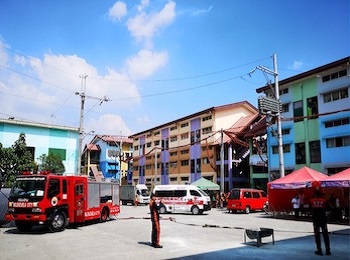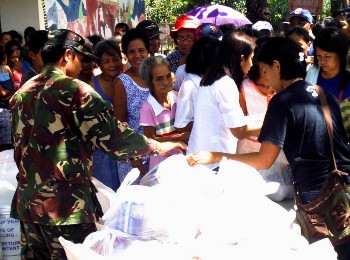Latest Issue

Volume 5, Issue 1, August 2023
This issue features assessment studies on the: 1) risks, sense of place, and preparedness of communities along a river; 2) climate change and civil-military coordination; 3) adaptive capacity to flooding of household in lakeshore communities; 4) disaster preparedness index of households and LGUs; 5) risk and impacts of tropical cyclones on banana production in the Philippines.
Download Full Issue
Journal Articles

Building Back Better After Disasters: Enhancing Community Resilience Through In-City Resettlement in Valenzuela City, Philippines
- Volume 5, Issue 2, September 2023
How can local governments build the resilience of disaster-affected households? This is an important concern since climate change is expected to worsen climate-related disasters especially among vulnerable sectors such as the urban poor in developing countries. For the Philippines, the most at-risk country in the World Risk Index 2022, it is important to address the vulnerability of the urban poor living in danger zones.

Characterizing the risk and impacts of tropical cyclones on banana production in the Philippines
- Volume 5, Issue 1, August 2023
The Philippines is highly exposed and vulnerable to tropical cyclones (also known as typhoons), which caused over ₱352 billion worth of losses and damages to agriculture between 2000 and 2021. The study focuses on the impacts of typhoons on banana production in the Philippines. Bananas are a crucial crop for consumption, nutrition and the economy. Mindanao accounts for a majority of the country’s production. The study examines the physical sensitivity of bananas to hazards like typhoons, considering factors such as wind speed, flood-prone areas, and slope, using geographical methods.

Disaster Preparedness Index of Households and Selected Local Government Units in Laguna, Philippines
- Volume 5, Issue 1, October 2022
There is a need to strengthen disaster preparedness and resilience at all levels of society in the
country. This study was conducted to assess, based on capitals, the level of disaster preparedness
of selected households, barangays, and municipalities in the Province of Laguna.

Enhancing Adaptive Capacity to Flooding of Households: Evidence from Lakeshore Communities of Pila, Laguna, Philippines
- Volume 5, Issue 1, June 2022
With the increasing incidence of extreme weather events, it is important to identify appropriate strategies to enhance the adaptive capacity of households. In the Philippines for example, climate-induced flooding is displacing many people. This is true in the case of Pila, Laguna, Philippines, which is often flooded when there are typhoons and monsoon events. Strong typhoons in the past caused houses near the lake to be submerged in flood waters and forced households to evacuate. The impact however on these households would vary depending on their adaptive capacities. This study aims to assess the adaptive capacities of households in lakeshore communities susceptible to flooding and identify strategies for policy-makers.

Climate Change and Civil-Military Coordination in the Philippines: How climate change disasters will impact aid delivery in areas affected by conflict
- Volume 5, Issue 1, March 2022
Bringing aid to disaster-stricken communities is complex, especially in the Philippines where destructive typhoons are intensifying due to climate change. This paper illustrates the coordination for humanitarian aid from Philippine government instrumentalities, the military, uniformed personnel, and civilian sectors as well as from, multilateral organizations and non-government organizations, both local and international during state of national calamities like Typhoon Haiyan. Disaster response increases in complexity in conflict zones such as Bangsamoro Autonomous Region of Muslim Mindanao (BARMM), where armed non-state actors have been active for many years. Encapsulated are the perceptions of 30 respondents coming from government agencies involved in disaster risk reduction and management, including the military and uniformed personnel including humanitarian and relief agencies, during both peacetime and conflict. This embodies challenges in civil-military engagement in balancing mandated tasks such as security, maintaining peace and order, preserving sovereignty, and preventing terrorism with adherence to humanitarian principles and frameworks even while striving to deliver basic humanitarian services in the nexus of climate change and conflict.

Flood Disaster Risk, Sense of Place, and Preparedness of Entrepreneurs in Communities along a River
- Volume 5, Issue 1, November 2021
Restarting business after river floods
The impacts of river floods on small and medium-scale enterprises are significantly felt in the damage and losses experienced by owners and managers who are already saddled with keeping going their businesses related to food, industry, and farm. Such depressing experiences, evident likewise on their flood disaster risk perceptions, should have reduced the value of the place of their business operations or entrepreneurial activities. But they insisted on remaining and rebuilding after disastrous floods rather than stopping or relocating away from hazards. Interestingly, this survey of a non-probability sample of 36 enterprise owners and managers along the Ocoy River in Negros Oriental, Philippines, revealed that flood disaster risk perception is positively and significantly related to their sense of place. Incidentally, they had a low disaster preparedness, although not significantly associated with these two variables, suggesting the high value they assigned to their communities despite a high flood risk. Only place dependence as an economic component of the sense of place was positively and significantly related to flood disaster preparedness which explains their reluctance to relocate. Therefore, as part of enterprises; formal requirements for a business permit, the entrepreneurs must undergo flood disaster preparedness orientation to adapt to climate change.
Climate Change Impacts and Transformative Adaptation Strategies among Farming Households in the City of Koronadal, Philippines
- Volume 4, Issue 1, April 2021
This study assessed the climate trends, changes, impacts, and adaptation strategies of farm households in five barangays in the Roxas mountain range, Koronadal City, South Cotabato by using household survey data from 265 respondents, and complimented with focus group discussions, and key informant interviews. The findings of the study revealed that climate changes are manifested by floods, landslides, and droughts as experienced by the local people which caused devastation and affected socioeconomic and environmental conditions of farming livelihood. Farmers used to have bountiful harvests, however, this situation recently changed due to the increasing climate-related risk events. The existing adaptation strategies are just stop-gap solutions that address the effects of climate change, but do not consider the root causes. To consider future changes in climate patterns, the socioeconomic and political structure and processes of the communities need to change by addressing multifaceted drivers of climate change hazards and their impacts. Some grassroot-level transformative adaptation strategies identified in the study consisted of socioeconomic facets, specifically, investment in children’s education, financial management, family planning, and development of alternative on-farm and nonfarm livelihood options. The environmental aspect, including the promotion of agroforestry system, water impoundment technologies, and advanced early warning system, were also considered.

Philippine Institutions and Complex Institutional arrangements for Climate Change Adaptation in Agriculture
- Volume 4, Issue 1, January 2021
The Philippines is one of the countries
highly vulnerable to climate change, and this condition threatens further the meager
agricultural production in the country. However, while the Philippines has
established the institutional foundations linking climate change to agriculture,
through policies and legislation, advances in climate change adaptation have
been slow, especially at the local level. This paper demonstrated that this gap
in policy formulation and actual implementation stems from the lack of institutional
analysis in CCA efforts in the Philippines. The paper concludes that along with
the scientific and technological discussions, institutional conversations
should be among the initial vital steps in CCA planning, and policy and
decision-making. It further advocates that institutional analysis can be the
entry point for designing reforms toward effective CCA implementation.

Impacts of Carbon Dioxide Emissions on Global Intense Hydrometeorological Disasters
- Volume 4, Issue 1, January 2020
This paper connects climate change and hydrometeorological
calamities based on econometric evidence that links atmospheric CO2
accumulations to floods and storms. The study uses climate data from 155
countries, with a period spanning 46 years (1970–2016) and adopted a
statistical and econometric approach to assess the factors that have
contributed to the increase in the frequency of intense flood and storm events.
Findings showed that the number of climate disasters could double in less than 21
years, and thus severely damage the environment, socioeconomic progress, and
welfare of millions of people worldwide.

Simulating Impacts of ENSO and Climate Change on Sugar Cane Production in Negros Occidental Province, Philippines
- Volume 4, Issue 1, November 2019
The Philippines is a global player in sugar cane production with Negros province, aka “sugarlandia”, accounting for 80% of national production. As changes in climatic conditions have and will continue to directly or indirectly affect sugarcane production, we should understand better how climate change and the El Niño-Southern Oscillation (ENSO) events will impact production targets and future irrigation requirements. This paper demonstrates how a crop model can be used to assess the present and mid-century impacts of ENSO and climate change on sugarcane growth and productivity in Negros Occidental province, Philippines.
-
A+
-
A
-
A-


